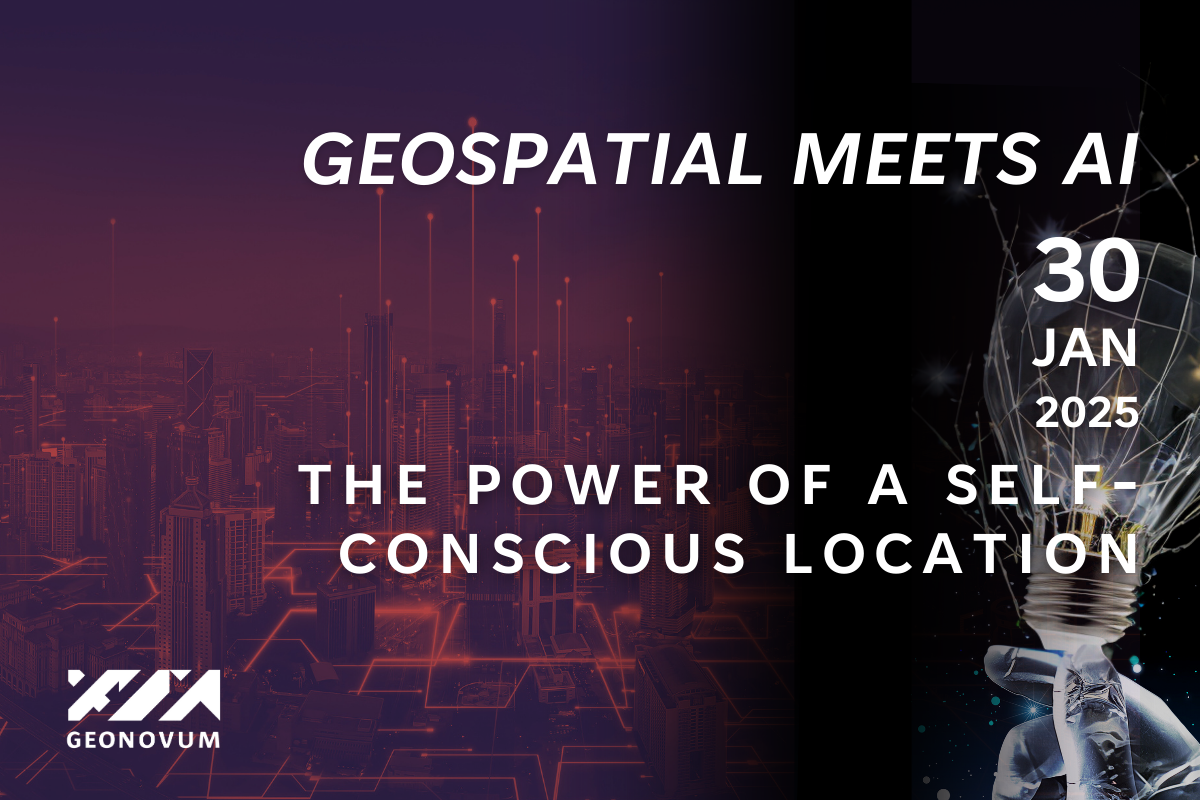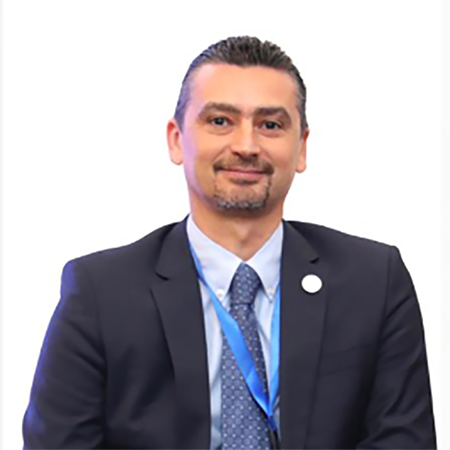January 30 2025 from 10.00 to 12.00 (Amsterdam time, UTC+1) we are organising the Webinar Geospatial meets AI: The power of a self-conscious location. This webinar is part two in a series of three webinars: Location and AI: Mapping the Future with Artificial Intelligence, hosted by the geospatial expert organisations, Location Innovation Hub, Geovation UK and Geonovum, with partners including Eurogeographics and the Open Geospatial Consortium.

Theme
The integration of geospatial technologies and artificial intelligence is transforming how we understand and interact with our environment. From digital twins to autonomous navigation, these cutting-edge innovations are pushing the boundaries of spatial awareness, leading us toward a future where locations are not just mapped but actively responsive and self-aware. Join us for an engaging webinar as we explore how AI and geospatial data are reshaping industries, driving decision-making, and paving the way for use of intelligent, self-conscious locations.
Leaders from business, NGO and academy will take you along in a thoughtful journey of potential, opportunities and challenges in a changing geo spatial world.
Be part of this webinar and discover how AI will change the power and use of location intelligence. Whether you are a tech enthusiast, a business leader or have a governmental concern, this event offers valuable insights and opportunities to drive the power of location intelligence forward. Register here
Technical tips to view this webinar
- Don't forget to press the play button to start the live broadcast.
- Using a VPN may cause the broadcast to not play properly and/or the interaction tool to function incorrectly.
- In case you'll get the notification 'server error', empty the cache in your browser or try to access the link using a different browser (e.g. Firefox, Google Chrome, ...), or open the link in an 'inprivate' window.
- A slight delay may occur with a live connection: wait a few seconds if the presentation doesn’t start immediately at the scheduled time.
Programme
10:00 Introduction | Bart de Lathouwer (Geonovum)
10:10 Vision on the concept of geospatial and AI and its potential
- It's all about the data - Is Geo ready for AI? | Ed Parsons, Geospatial Technologist, Google
10:25 Showcasing Geospatial And AI. How location knowledge is generated and interfaced to steer decision making
- Transformative geographic question answering | Simon Scheider, Human Geography and Spatial Planning, Universiteit Utrecht
- Hari Subhash , Sr. Director of Marketing, Kinetica
- Bart Adams, CTO xyzt.ai
11:10 Geospatial community, standardization and governance
- Opportunities and Challenges of Geospatial Foundation Models | Kyoungsook Kim, Deputy Director, AIRC; Chair OGC GeoAI Domain Working Group
- Standardizing the Future of GeoAI: International Concerns and the Path to Harmonization | Ashraf Abushady, Directorate of Technical Cooperation and Sustainable Industrial Development, Division of Digital Transformation and AI Strategies, United Nations Industrial Development Organization
- Introduction to AI & Location online course package | Eeva Sankari, Location Innovation Hub
11:55 Panel discussion: How we make the most of an artificial intelligent location
Speakers will join in a panel discussion moderated by Bart de Lathouwer.
12:15 Closing remarks
This event is organised by Geonovum and is a part of the International Location and AI: Mapping the Future with Artificial Intelligence webinar series hosted by international geospatial expert organisations Location Innovation Hub, Geovation UK andGeonovum with partners including Eurogeographics and the Open Geospatial Consortium.
Register now
Ed Parsons
Ed Parsons is a Digital Geographer and Keynote Speaker. He is currently Google’s Open Data Lead. Ed was Google’s Geospatial Technologist, with responsibility for evangelising Google’s mission to organise the world’s information using Geography. In this role he maintains links with Governments, Universities, Research and Standards Organisations which are involved in the development of Geospatial Technology. Ed also leads Google’s efforts in maintaining a healthy Open Data Ecosystem in Europe. He is a member of the Board of Directors of the Open Geospatial Consortium and was co-chair of the W3C/OGC Spatial Data on the Web Working Group. He also represents Google at the EMTEL committee of ETSI developing geospatial solutions for emergency telecommunications. He is a Visiting Professor at University College London and has been an industry advisor to a number of international universities.
Ed was the first Chief Technology Officer in the 200-year-old history of Ordnance Survey, and was instrumental in moving the focus of the organisation from mapping to Geographical Information. He came to the Ordnance Survey from Autodesk, where he was EMEA Applications Manager for the Geographical Information Systems (GIS) Division. He earned a Masters degree in Applied Remote Sensing from Cranfield Institute of Technology, holds a Honorary Doctorate in Science from Kingston University, London. and is a fellow of both the Royal Geographical Society, and the Royal Institute of Navigation .
In 2024 Ed was awarded the inaugural “Professional Geography Award” for excellence in the use of geography in professional practice by the Royal Geographical Society.

Ed Parsons, Digital Geographer, Keynote Speaker and Google’s Open Data Lead.
Bart Adams
Bart Adams is the Founder and Chief Technology Officer at xyzt.ai, a high-tech SaaS company offering a cloud-based platform for visualizing and analyzing large-scale location data from vehicles, vessels, aircraft, individuals, and assets. Under Bart's leadership, the platform reached a new level of sophistication with the introduction of the “Just Ask xyzt.ai” feature, which allows users to query complex datasets using natural language, making advanced data insights more accessible and intuitive. Bart holds an M.Sc. in Engineering from the University of Leuven, for which he was awarded the IBM Best Master’s Thesis Prize. He later earned a Ph.D. in Engineering from the same university, followed by post-doctoral research at Stanford University, supported by fellowships from the Fund for Scientific Research Flanders (FWO) and the Belgian American Educational Foundation (BAEF).
Bart's recent achievements include being named an IDC Geospatial Innovator and being listed among the Global Top 100 Geospatial Companies by Geoawesomeness. As an active member of the Open Geospatial Consortium, Bart is passionate about leveraging effective data analysis and visualization techniques to create innovative, customer-driven solutions that drive tangible business value.

Bart Adams, CTO of xyzt.ai
Simon Scheider
Simon Scheider is an associate professor in geographic information science at the department of human geography and spatial planning at Utrecht University. His research lies at the interface between conceptual modeling, geographic data analysis and knowledge extraction. He is particularly interested in understanding the concepts underlying spatio-temporal data, including reference systems, fields, places, spatial objects, events, trajectories and their relationship to human activities, and in practical methods for modeling and handling them with GIS and Articial Intelligence (AI).
Simon Scheider will talk about Transformative geographic question answering
The recent trend of adopting Artificial Intelligence (AI)-based methods has spurred hopes that geographic information can be successfully reused across disciplines without requiring the technical skills of GIS. Geographic question-answering (GeoQA), answering questions with geographic information, has therefore become an area of interest. However, in such systems, answers are usually directly matched to questions. Yet, most questions data scientists want to answer require some form of geo-analytical transformation of maps. Answers need to be given indirectly, by regenerating maps from various geodata sources, rather than retrieved from storage. Regarding this problem, I will report on the insights gained in a recent European Research Council (ERC) funded project (QuAnGIS). Furthermore, I will give an outlook on transformative GeoQA, wich is a way to interpret geographic questions in terms of the procedures for answering them. This may allow describing geodata as a source or purpose of geo-analytical transformations.

Simon Scheider, associate professor in geographic information science at the department of human geography and spatial planning at Utrecht University
Kyoung-Sook Kim
Presentation: Opportunities and Challenges of Geospatial Foundation Models
Kyoung-Sook Kim is a deputy director at the Artificial Intelligence Research Center at the National Institute of Advanced Industrial Science and Technology (AIST) in Japan. Her research interests include spatiotemporal data platforms, big data analysis, data integration, etc. She currently contributes to international standardization related to big data and AI quality by serving as the project leader of ISO/IEC 5259-2, an expert of ISO/IEC/JTC 1 SC 42 (AI) WG 2 (Data), IEC SyC Smart Cities WG 3 (Reference Architecture), ISO/TC 204 WG 3(ITS database technology), and a co-chair of Moving Features SWG, GeoAI DWG and Urban Digital Twins DWG of the Open Geospatial Consortium (OGC).
Kyoung-Sook Kim, deputy director at the Artificial Intelligence Research Center at the National Institute of Advanced Industrial Science and Technology (AIST) in Japan
Ashraf Abushady
Ashraf Abushady is a Senior Advisor on Digitalization and Artificial Intelligence (AI) at the United Nations Industrial Development Organization (UNIDO). With over 20 years of experience in the digital transformation sector, Ashraf has been instrumental in driving AI initiatives for sustainable industrial development, focusing on industry standards, smart manufacturing, and AI governance. He has led key AI-focused projects that support emerging economies, and his work aligns closely with the UN’s Sustainable Development Goals (SDGs), particularly in promoting ethical and sustainable AI practices. Ashraf has spoken at various global platforms about the role of AI in transforming industries and promoting global cooperation.
Ashraf's educational background includes a Doctorate in Technology (Dr. Tech., h.c.) with a specialization in Information Technology and Artificial Intelligence from the European International University - Paris, and a Master of Science in Communications and Information Technology from the Vienna University of Technology. His work emphasizes sustainable practices in AI and the democratization of technology, aligning with his commitment to ethical and inclusive technology policies.

Ashraf Abushady, Senior Advisor on Digitalization and Artificial Intelligence (AI) at the United Nations Industrial Development Organization (UNIDO).
Hari Suhash
Hari Subhash is senior director of Marketing at Kinetica. In his talk he will explore the types of spatial tools you can build with generative AI and the challenges of building them at scale. He will also discuss the key building blocks for creating a generative AI tool that enables users to interact with spatial data through natural language.
.